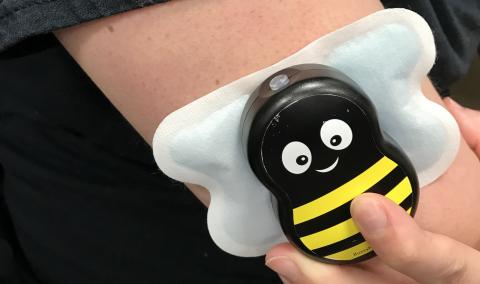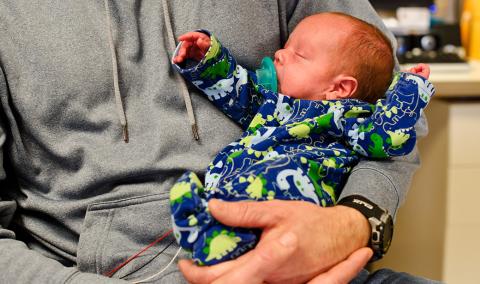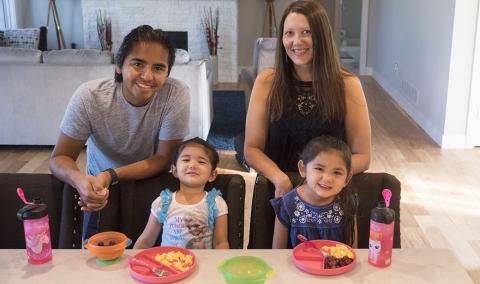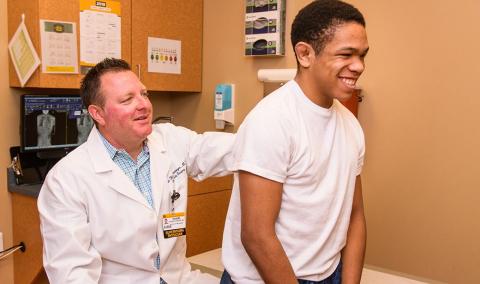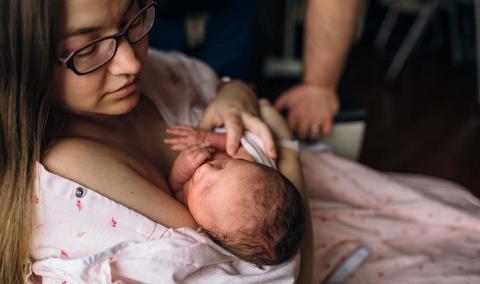When your child has digestive problems, it can lead to painful or embarrassing symptoms. Our pediatric experts help kids find relief.
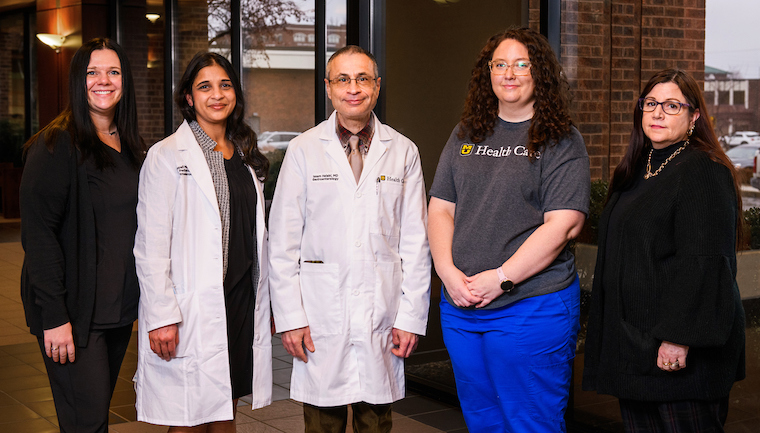
Digestion is the body’s process of breaking down food and moving it through the body. When the digestive process isn’t working properly, that can lead to uncomfortable symptoms such as constipation, diarrhea or abdominal pain. Symptoms can come and go suddenly or linger and might be the result of a chronic condition.
Our team at Children's Hospital is the only group in mid-Missouri dedicated to the diagnosis and treatment of children's gastrointestinal problems. Our goal is to help you find answers and help your child find relief.
Who should be evaluated by our pediatric gastroenterology experts?
You should consider seeking care from gastroenterology experts with experience caring for kids if your child experiences any of the following symptoms:
- Abdominal pain or bloating.
- Altered bowel habits including constipation, diarrhea or bloody stool, or polyps.
- Difficulty with feeding, including problems with swallowing.
- Vomiting blood.
- Pain or discomfort in the stomach or esophagus during or after eating.
- Weight issues, including inability to gain weight.
Expert, personalized care for pediatric gastrointestinal diseases
As part of a Children's Hospital, we specialize in kids. Our team has special training and years of experience in diagnosing and treating children, and we work alongside other pediatric specialists to ensure your family gets the attention and care you deserve.
We can treat the simplest conditions to the most complex, and our pediatric gastroenterologists will work with you to develop a personalized treatment plan for your child.
How we diagnose pediatric gastrointestinal diseases
Our pediatric gastroenterology experts are experienced in diagnosing the most complex conditions. They use specialized imaging and diagnostic tests to find the cause of your child's symptoms and develop a plan to help your child feel better.
Our pediatric gastroenterology team is the only one in mid-Missouri to offer capsule endoscopy, a safe and painless way for us to look inside your child's small intestine. This involves a tiny wireless camera inside of a pill that you child will swallow. The camera transmits images of your child's intestine to help with diagnosis. Capsule endoscopy is used to diagnose conditions of the small intestine. The benefit of this method is that it doesn't require anesthesia like traditional endoscopy.
Other diagnostic tests we offer:
- Blood and stool sample tests, which provide detailed information that can help guide further diagnostic testing.
- Pediatric pH impedance monitoring, which measures the amount of stomach acid moving up into the esophagus over a 24-hour period.
- Biopsy, a small tissue sample collected from inside the body during a “scope” procedure or by a needle, using anesthesia, and examined under a microscope.
- Endoscopy, a procedure that allows doctors to examine the esophagus, stomach and small intestines under anesthesia.
- Manometry, a test that measures muscular pressure in different parts of the gastrointestinal system, and therefore how well food moves, using a catheter filled with a pressure-sensitive liquid or solid. Manometry can measure pressure in the esophagus, (esophageal manometry), stomach and small intestine (antroduodenal), large intestine (colonic) and rectum (anorectal).
- Esophagogastroduodenoscopy (EGD), which involves inserting a thin, flexible tube with a light through the mouth and throat while using anesthesia to see inside the esophagus, stomach and small intestine.
- Colonoscopy, which allows our team to see the inside of the colon and large intestine by inserting a thin, flexible tube with a camera into the rectum while the patient is under anesthesia.
Upper gastrointestinal diseases we diagnose
Although they can be uncomfortable or even painful, most pediatric digestive disorders can be successfully treated or managed once correctly diagnosed. Our team will work with you and your family to assess how to proceed, starting with dietary changes and medication. We can help treat conditions from the esophagus through the stomach, including:
- Achalasia, a rare esophageal disorder in which the esophageal sphincter does not open up, making it difficult for food and liquid to move into the stomach.
- Rumination syndrome, when swallowed food that is not yet digested is regurgitated.
- Swallowing issues, including dysphagia, esophageal dysmotility, esophageal strictures and eosinophilic esophagitis, a chronic immune disease that causes pain and discomfort because of white blood cells collecting in the esophagus.
- Gastroesophageal reflux (GERD) and reflux esophagitis.
- Gastroparesis, a complicated condition when the stomach is unable to empty properly or empties slower than normal and is not caused by another condition such as medication side effects.
- Liver disease and hepatitis.
- Helicobacter pylori, an infection that occurs from bacteria in the stomach and is a common cause of ulcers in children.
- Celiac disease.
- Crohn's disease and inflammatory bowel disease.
- Pyloric stenosis, malrotation or improper development of the intestines.
Lower gastrointestinal diseases we diagnose
Gastrointestinal motility, or the process of moving food through the body, is an important function of the body. Your muscles contract and relax to move food and liquids from the esophagus, through the digestive tract to the bowel. At MU Health Care, we have Mid-Missouri's only specialty clinic dedicated to motility disorders in children, with personalized care to help you and your family figure out when something is wrong and to plan the next steps.
Conditions we can help with include:
- Functional abdominal pain syndrome, or pain that occurs in the abdomen that cannot be explained by testing or examination and can be continuous or intermittent pain.
- Chronic constipation, or struggling to empty the bowels, typically defined as having less than three bowel movements per week.
- Intestinal pseudo-obstruction, a rare nerve or muscle condition with symptoms consistent with a blockage or obstruction within the intestines, but without a physical blockage.
- Irritable bowel syndrome.
- Small bowel bacterial overgrowth, caused by an increase in bacteria within the small intestines that can lead to slowing the digestive tract and bowel. movements.
- Hirschsprung's disease, a birth defect in which the intestinal wall nerves did not form properly, leading to difficult bowel movements and possible bowel obstructions.
- Fecal incontinence, the inability to hold or control bowel movements that can result in feces leaking from the rectum.
How we treat pediatric gastrointestinal diseases
As part of the region's only Children's Hospital, our pediatric gastroenterology experts work with other pediatric specialists such as pediatric surgeons, nurses, dietitians, psychologists and therapists to create a personalized treatment plan for your child.
For many conditions, our first step is to try dietary and lifestyle changes or medication. In some cases, therapy might help relieve your child's symptoms by establishing healthy bathroom habits such as posture or relaxation. If surgery is recommended, our team will collaborate with our pediatric surgery team and will coordinate appointments and follow-up care through our clinic.
Related Conditions & Treatments
- Adolescent Medicine
- Chest Wall Deformities
- Down Syndrome
- Emergency Care for Kids
- Gastrostomy and Feeding Access Program
- Hyperbaric Oxygen Therapy
- Juvenile Diabetes
- Neonatology
- Pediatric Anesthesiology
- Pediatric Cancer
- Pectus Carinatum
- Pectus Excavatum
- Pediatric Cardiology
- Pediatric Dermatology
- Pediatric Development and Behavior
- Pediatric ENT (Ear, Nose and Throat)
- Pediatric Epilepsy
- Pediatric Eye Care
- Pediatric Gastroenterology
- Pediatric Infectious Diseases
- Pediatric Inpatient Rehabilitation
- Pediatric Nephrology
- Pediatric Neurology
- Pediatric Neurosurgery
- Pediatric Orthopaedics
- Pediatric Plastic Surgery
- Pediatric Primary Care
- Pediatric Psychiatry
- Pediatric Pulmonary Medicine
- Pediatric Sleep Medicine
- Pediatric Surgery
- Pediatric Surgical Services
- Pediatric Urology
- Pediatric Vascular Anomalies
- Pediatric Weight Management
- Sickle Cell Disease
- Aerodigestive Program








